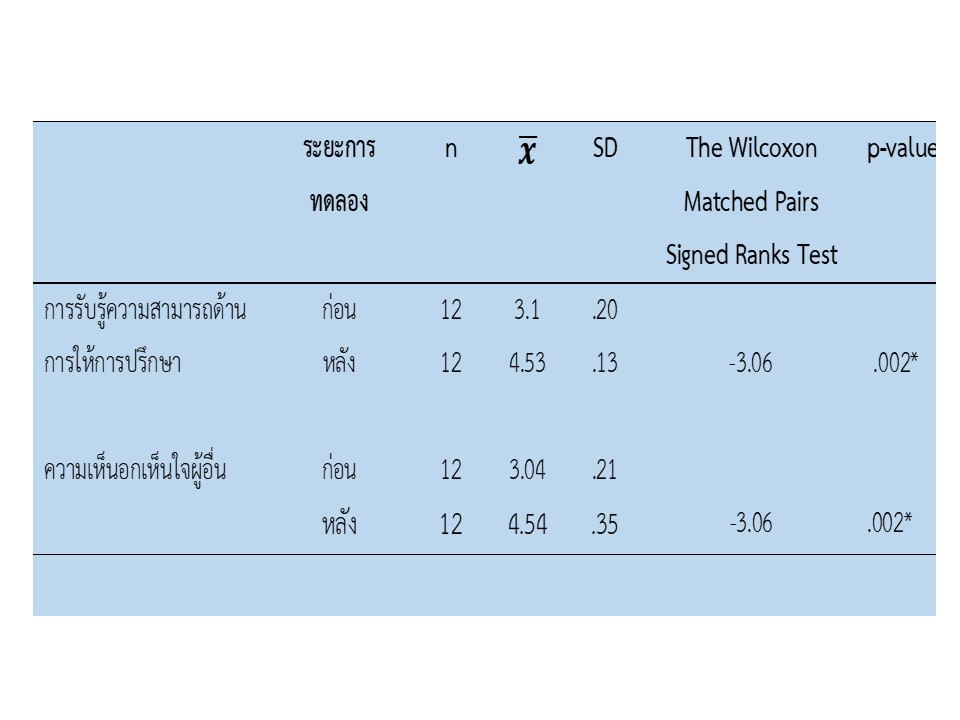ผลของกลุ่มพัฒนาตนออนไลน์ต่อการรับรู้ความสามารถด้านการให้การปรึกษาและความเห็นอกเห็นใจผู้อื่นของนักเรียนแกนนำเพื่อนที่ปรึกษา ชั้นมัธยมศึกษาตอนปลาย โรงเรียนนาทวีวิทยาคม
คำสำคัญ:
กลุ่มพัฒนาตน, การรับรู้ความสามารถด้านการให้การปรึกษา, ความเห็นอกเห็นใจผู้อื่น, นักเรียนเพื่อนที่ปรึกษาบทคัดย่อ
การวิจัยกึ่งทดลองครั้งนี้มีวัตถุประสงค์ 1) เพื่อศึกษาผลของกลุ่มพัฒนาตนออนไลน์ต่อการรับรู้ความสามารถด้านการให้การปรึกษาของนักเรียนแกนนำเพื่อนที่ปรึกษา และ 2) เพื่อศึกษาผลของกลุ่มพัฒนาตนออนไลน์ต่อความเห็นอกเห็นใจผู้อื่นของนักเรียนแกนนำเพื่อนที่ปรึกษา ชั้นมัธยมศึกษาตอนปลาย โรงเรียนนาทวีวิทยาคม โดยคัดเลือกกลุ่มตัวอย่างแบบเจาะจง คือ นักเรียนแกนนำเพื่อนที่ปรึกษา ชั้นมัธยมศึกษาตอนปลาย จำนวน 12 คน เข้าร่วมกิจกรรมกลุ่มพัฒนาตนออนไลน์ จำนวน 6 ครั้ง ครั้งละ 1.30 ชั่วโมง ซึ่งรวบรวมข้อมูลจากแบบวัดการรับรู้ความสามารถด้านการปรึกษาและแบบวัดความเห็นอกเห็นใจผู้อื่น จากนั้นนำมาวิเคราะห์ข้อมูลด้วย สถิติเชิงบรรยาย คือ ค่าเฉลี่ย ค่าเบี่ยงเบนมารตฐาน ค่าร้อยละ และการทดสอบวิลคอกซัน ผลการวิจัยพบว่า นักเรียนแกนนำเพื่อนที่ปรึกษาที่เข้าร่วมกลุ่มพัฒนาตนออนไลน์ มีคะแนนเฉลี่ยการรับรู้ความสามารถด้านการให้การปรึกษาและความเห็นอกเห็นใจผู้อื่น หลังการทดลองสูงกว่าก่อนการทดลองอย่างมีนัยสำคัญทางสถิติที่ระดับ .01
เอกสารอ้างอิง
ธีรพัฒน์ วงศ์คุ้มสิน. (2564). การพัฒนาความเห็นอกเห็นใจผู้อื่นของนิสิตจิตวิทยามหาวิทยาลัยเกษตรศาสตร์ โดยโปรแกรมการให้คำปรึกษาแบบกลุ่ม.วารสารสังคมศาสตร์และมนุษยศาสตร์, 47(1), 75-98.
นันทยา คงประพันธ์. (2020). ปัจจัยที่มีผลต่อภาวะซึมเศร้าในวัยรุ่น กรณีศึกษา: มหาวิทยาลัยเทคโนโลยีราชมงคลสุวรรณภูมิ. Journal of Social Science and Buddhistic Anthropology, 5(11).
ปรียานุช มาตยารักษ์. (2556). ผลของโปรแกรมกระบวนการกลุ่มพัฒนาการเข้าใจความรู้สึกผู้อื่นของวัยรุ่น. วารศาสตร์ศึกษาศาสตร์, 7(1), 104-112.
พัชราภรณ์ ศรีสวัสดิ์. (2561). การศึกษาและพัฒนาการรับรู้ความสามารถในการให้คำปรึกษาของครูแนะแนว.วารสารวิชาการศึกษาศาสตร์, 19(1), 150-159.
วรางคณา โสมะนันทน์, คาลอส บุญสุภา และพลอยไพลิน กมลนาวิน. (2564). การให้บริการการปรึกษาเชิงจิตวิทยาแบบออนไลน์ : มิติใหม่ของการให้บริการการปรึกษาเชิงจิตวิทยา. วารสารบัณฑิตศึกษา มหาวิทยาลัยราชภัฏวไลยอลงกรณ์ ในพระบรมราชูปถัมภ์, 15(1), 247-260.
สำนักวิชาการและมาตรฐานการศึกษา. (2552). รหัสลับความสำเร็จนักเรียน YC. กรุงเทพฯ: ชุมนุม สหกรณ์การเกษตรแห่งประเทศไทยจำกัด.
สำนักวิชาการและมาตรฐานการศึกษา. (2553). หลักสูตรฝึกอบรมนักเรียน: นักเรียนที่ปรึกษา. กรุงเทพฯ: ชุมนุมสหกรณ์การเกษตรแห่งประเทศไทย จำกัด.
สุขอรุณ วงษ์ทิม. (2561). “ทักษะการสร้างสัมพันธภาพ” ในเอกสารการสอนชุดวิชาเทคนิคการปรึกษาเบื้องต้น. นนทบุรี : โรงพิมพ์มหาวิทยาลัยสุโขทัยธรรมาธิราช.
American Psychological Association. (2013). Guidelines for the Practice of Telepsychology. American Psychologist. 68(9), 791–800.
Arudo T.O. (2008). Peer Counseling Experience among Selected Kenyans Schools. www.kapc.org.ke
Bandura, A. (1977). Self-efficacy: Toward a unifying theory of behavioral change. Psychological Review, 84(2), 191-215.
Bandura, A. (1997). Self-Efficacy: The Exercise of Control. New York: W.H. Freeman and Company.
Bandura, A. (1999). Social cognitive theory of personality. In L. A. Pervin & O. P. John (Eds.), Handbook of personality: Theory and research (pp. 154–196). Guilford Press.
Child and Adolescent Mental Health Rajanagarindra Institute. (2017). mattrathan borikan kan khham pruksawarin [Standards of service Counseling for Teenager]. Bangkok: Beyond Publishing.
Creswell, J. W., & Creswell, J. D. (2017). Research design: Qualitative, Quantitative, and Mixed Methods Approaches. SAGE Publications.
Department of Health and WHO Thailand. (2021). Global School-based Student Health Survey. https://cdn.who.int/media/docs/default-source/ncds/2021-thailand-gshs-fact-sheet.pdf.
Ezhumalai, S., Muralidhar, D., Dhanasekarapandian, R., and Nikketha, B. S. (2018). Group interventions. Indian J. Psychiatry 60 (Suppl. 4), S514. doi: 10.4103 psychiatry.IndianJPsychiatry_42_18.
Gunawan, I. M. S., Wibowo, M. E., Purwanto, E., & Sunawan, S. (2019). Group Counseling of Values Clarification to Increase Middle School Students. Empathy. PsicologiaEducativa, 25(2), 169–174. https://doi.org/10.5093/psed2019a5.
Ierardi, E., Bottini, M. & Riva Crugnola, C. (2022). Effectiveness of an online versus face-to-face psychodynamic counselling intervention for university students before and during the COVID-19 period. BMC Psychology, 10:35. https://doi.org/10.1186/s40359-022- 00742-7.
Khattar, T. (2014). The Role of Empathy in building Counselling Self-Efficacy for Counsellors-in-Training. Journal of Psychological Research, (58)1, 40-46.
Larson, L. M., & Daniels, J. A. (1998). Review of the counseling self-efficacy literature. The Counseling Psychologist, 26(2), 179–218.
Roger, C. R. (1959). A Theory of Therapy, Personality, and Interpersonal Relationships: As Developed in the Client-Centered Framework. In S. Koch (Ed.), Psychology: A Study of a Science. Formulations of the Person and the Social Context (Vol. 3, pp. 184-256). New York: McGraw Hill.
Santrock, J. (2013). Childhood Development. 14th Edition, New York: McGraw-Hill Education.
Schwarzer, R., & Jerusalem, M. (1995). General Self-Efficacy Scale (GSE) [Database record]. APA PsycTests. https://doi.org/10.1037/t00393-000.
Trotzer, J. P. (2006). The counselor and the group: Integration theory, training, and practice. Monterey, CA: Brook Cole.

ดาวน์โหลด
เผยแพร่แล้ว
รูปแบบการอ้างอิง
ฉบับ
ประเภทบทความ
สัญญาอนุญาต
ลิขสิทธิ์ (c) 2024 วารสารทัศนมิติทางการศึกษา

อนุญาตภายใต้เงื่อนไข Creative Commons Attribution-NonCommercial-NoDerivatives 4.0 International License.



